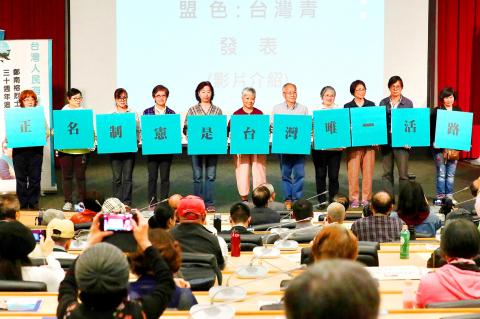The pro-Taiwanese independence Formosa Alliance is to part ways with the Democratic Progressive Party (DPP) and adopt a new, symbolic turquoise banner, the party said at a commemoration in Taipei yesterday of the 30th anniversary of the death of democracy advocate Deng Nan-jung (鄭南榕).
In 1984, Deng started Freedom Era Weekly (自由時代週刊) to pursue what he called “100 percent freedom of speech.”
In 1988, after publishing a draft “Republic of Taiwan constitution,” he was charged with sedition, after which he went into self-imposed isolation.

Photo: CNA
On April 7, 1989, following 70 days of isolation, he set himself on fire as heavily armed police attempted to break into his office.
In 2016, then-premier Lin Chuan (林全) designated April 7 as Freedom of Speech Day in honor of Deng.
Yesterday’s event drew more than 300 people for musical performances and speakers who shared their memories of Deng, as well as disappointments with the DPP administration.
The party has taken the helm twice, but refrains from telling the world that the nation is “Taiwan,” not “Chinese Taipei,” alliance founder and former Formosa TV chairman Kuo Pei-hung (郭倍宏) said.
The alliance has been urging the government to amend the Referendum Act (公民投票法) to allow referendums on declaring the nation’s independence and changing its name.
The Formosa Alliance plans to adopt turquoise as its color, because the color symbolizes the spirit of the ocean and the land of Taiwan, while differentiating it from the DPP, whose color is green, Kuo said.
“As Chinese President Xi Jinping (習近平) makes more blatant attempts to annex Taiwan, the DPP administration continues to lead the nation toward a dead end by failing to make the world know that the nation is called ‘Taiwan,’” he said.
Regrettably, today’s young people take freedom of speech for granted, while three decades ago, Deng had to sacrifice his life for it, New Power Party Legislator Hsu Yung-ming (徐永明) said.
Chen Yung-hsin (陳永興), founder of the Chinese-language Taiwan People News, called on the audience — mostly middle-aged or older people — to improve communication with the younger generation.
Many young people support President Tsai Ing-wen (蔡英文) because she promotes marriage equality, but they pay little attention to the issue of rectifying the nation’s name, which should be given equal importance, he added.

Alain Robert, known as the "French Spider-Man," praised Alex Honnold as exceptionally well-prepared after the US climber completed a free solo ascent of Taipei 101 yesterday. Robert said Honnold's ascent of the 508m-tall skyscraper in just more than one-and-a-half hours without using safety ropes or equipment was a remarkable achievement. "This is my life," he said in an interview conducted in French, adding that he liked the feeling of being "on the edge of danger." The 63-year-old Frenchman climbed Taipei 101 using ropes in December 2004, taking about four hours to reach the top. On a one-to-10 scale of difficulty, Robert said Taipei 101

Nipah virus infection is to be officially listed as a category 5 notifiable infectious disease in Taiwan in March, while clinical treatment guidelines are being formulated, the Centers for Disease Control (CDC) said yesterday. With Nipah infections being reported in other countries and considering its relatively high fatality rate, the centers on Jan. 16 announced that it would be listed as a notifiable infectious disease to bolster the nation’s systematic early warning system and increase public awareness, the CDC said. Bangladesh reported four fatal cases last year in separate districts, with three linked to raw date palm sap consumption, CDC Epidemic Intelligence

Taiwanese and US defense groups are collaborating to introduce deployable, semi-autonomous manufacturing systems for drones and components in a boost to the nation’s supply chain resilience. Taiwan’s G-Tech Optroelectronics Corp subsidiary GTOC and the US’ Aerkomm Inc on Friday announced an agreement with fellow US-based Firestorm Lab to adopt the latter’s xCell, a technology featuring 3D printers fitted in 6.1m container units. The systems enable aerial platforms and parts to be produced in high volumes from dispersed nodes capable of rapid redeployment, to minimize the risk of enemy strikes and to meet field requirements, they said. Firestorm chief technology officer Ian Muceus said

MORE FALL: An investigation into one of Xi’s key cronies, part of a broader ‘anti-corruption’ drive, indicates that he might have a deep distrust in the military, an expert said China’s latest military purge underscores systemic risks in its shift from collective leadership to sole rule under Chinese President Xi Jinping (習近平), and could disrupt its chain of command and military capabilities, a national security official said yesterday. If decisionmaking within the Chinese Communist Party has become “irrational” under one-man rule, the Taiwan Strait and the regional situation must be approached with extreme caution, given unforeseen risks, they added. The anonymous official made the remarks as China’s Central Military Commission Vice Chairman Zhang Youxia (張又俠) and Joint Staff Department Chief of Staff Liu Zhenli (劉振立) were reportedly being investigated for suspected “serious